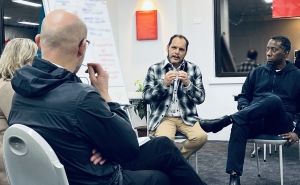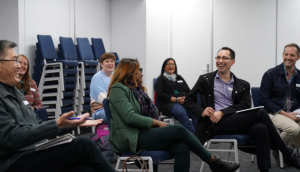Faith-Based Facilitation empowering local corps

Faith-Based Facilitation empowering local corps
14 July 2022
More than 60 Salvationists across Australia have already been trained in Faith-Based Facilitation as the Australia Territory roles out the new iteration of FBF Conversations.
The Salvation Army is full of passionate people with diverse life experiences, which sometimes means navigating differences of opinion. So, where do we go with our disagreements?
A new iteration of Faith-Based Facilitation (FBF) is providing Salvos across the country with tools to tackle complex moral and social issues head-on – seasoned with truth and grace.
 Two cohorts of Salvationists have participated in ‘FBF Fundamentals Facilitator Training’ in the past two weeks, and more cohorts will be trained in the coming weeks. They join a pool of Salvationists who have already been trained as Faith-Based Facilitators.
Two cohorts of Salvationists have participated in ‘FBF Fundamentals Facilitator Training’ in the past two weeks, and more cohorts will be trained in the coming weeks. They join a pool of Salvationists who have already been trained as Faith-Based Facilitators.
“FBF can be used to discuss any issue – from day-to-day issues to more complex moral and social issues. It is particularly helpful when discussing topics that can be divisive, or on which there are multiple points of view,” shares Casey O’Brien Machado, Territorial Faith-Based Facilitation Coordinator and Trainer, and Alternate Chair of the Moral and Social Issues Council (MASIC) Australia.
“Going through the FBF process with others causes us to slow down and be deliberate in our thinking, rather than rushing to conclusions or judgements. It takes us through a process of identifying the issue, describing and analysing it, reflecting on it and evaluating our thoughts, and then deciding how our exploration will impact the way we live.”
If the term Faith-Based Facilitation sounds familiar, it is with good reason. The model has been in use in The Salvation Army internationally since 2009, primarily in a community development context. As a result, the model – based on the Pastoral Cycle – is well-known throughout The Salvation Army world, more recently concerning conversations surrounding human sexuality.
Promoting conversations
In a post-COVID-19 world, The Salvation Army in Australia is re-establishing ‘FBF for Conversations’ as a conversational framework across the territory. In the past month, more than 60 Salvationists have been trained as FBF Fundamentals Facilitators, equipping them to use FBF to facilitate conversations on topics that can be divisive or hard to discuss. This adds to the already-existing pool of trained Facilitators in Australia.
Trainees have been nominated by their Divisional Commanders or Heads of Department, and some Facilitators will later be invited to undertake further training to facilitate conversations specifically around human sexuality. These newly-trained Facilitators are a resource in their own spaces, able to assist those involved in Salvation Army life to grapple with complex issues.
FBF Conversations typically take the form of a facilitated discussion between 8-10 people, lasting 90-120 minutes. During the conversation, there is room for sharing viewpoints and ideas, reflection and the reading of Scripture, and prayer.
“The purpose of FBF Conversations is not to make everyone taking part agree or to make them all think the same way. Each person may come out of the conversation drawing different conclusions and deciding different things for their own lives, and that is OK,” Casey says.
“There is room for difference within the people of God and within The Salvation Army. The important thing is that those viewpoints and beliefs are formed in a theologically-informed, well-founded way and that we as The Salvation Army learn to live with that difference faithfully.”
 Salvos travelled to Sydney Congress Hall last week for training as FBF facilitators, proving it’s not all serious conversation – there is laughter too!
Salvos travelled to Sydney Congress Hall last week for training as FBF facilitators, proving it’s not all serious conversation – there is laughter too!
A new tool in our belt
In the fast-paced, missional and often crisis-oriented work of Salvationists, the idea of a new framework can be off-putting. The beauty of FBF is that it isn’t new – it has been practised across the world for more than a decade with results. Now shaped to the conversations and needs of the Australia Territory, it is a tool that Salvos can use as they have difficult discussions in the pews, at Corps Council meetings, or over a cuppa with a community member.
“FBF is not supposed to add to people’s workloads; on the contrary, it’s intended to make ministry easier,” shares Casey. “This is not about changing anything. The only agenda is that we learn to understand God and each other better. As a result, we learn more about the world in which we live and minister. I’ve seen God move through the FBF process. The process has a remarkable way of opening people up to hearing from the Holy Spirit, and in doing so, we become more faithful followers of Christ.”
“As Salvationists, we believe that God wants to be present and active in every part of our lives, including in and through our ability to think, reason and form viewpoints and opinions. FBF helps us to do this in a way that is God-honouring and faithful, particularly in relation to complex issues. It is vital that we as The Salvation Army work through these issues together, rather than apart, and as a result continue to grow more into the Army that God wants us to be”.
If you are interested in participating in an FBF conversation or can see an area in which it would be helpful to hold one in your context, contact your corps officer or mission leader, who will contact Casey O’Brien Machado.